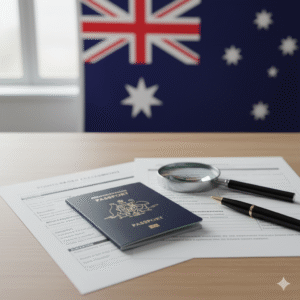How to write a character waiver letter for immigration
It can be hard to apply for a visa or residency, especially if you’ve made mistakes in the past. If you need to write a character waiver for your immigration application, you might be wondering where to start and what to say. A character waiver letter is your chance to explain your situation, show how you’ve changed as a person, and show why you deserve another chance.
This guide will teach you everything you need to know to write a good immigration character waiver letter. This guide will help you make the best of your situation, whether you’re going through New Zealand’s immigration system under sections 15 or 16 of the Immigration Act 2009 or applying somewhere else.
Knowing what’s at stake and how to make your case clear can make a big difference in the outcome of your application.
What does it mean to have a character waiver?
A character waiver is a formal request for immigration officials to ignore certain parts of your background that would normally keep you from entering or staying in a country. These things often include past immigration violations, criminal convictions, or breaking the terms of a visa.
Immigration laws are in place to keep the country safe and secure. But the authorities know that people can change. A character waiver gives people who have made mistakes a way to show that they are no longer a danger and have changed their ways.
The Law Behind Character Waivers
In New Zealand, character waivers are usually given out under sections 15 or 16 of the Immigration Act 2009. Section 15 lets you give special instructions in some situations, and section 16 gives you the power to do so for humanitarian reasons or other unusual situations.
Knowing the law will help you write your waiver letter in the right way and answer any questions immigration officials may have.
Common Reasons for Needing a Character Waiver
If you have any of the following, you may need to apply for a character waiver:
- Criminal convictions: These can be for minor crimes or more serious ones.
- Visa violations: include things like working without permission or staying longer than allowed on a visa.
- Immigration fraud: Providing false information on previous applications
- Concerns about character: groups or activities that make people worry about safety
- Health problems::Sometimes, health problems may mean that a waiver is needed.
Your waiver letter should be written in a way that fits your situation, since every situation is different.
Can I Get a Character Waiver?
Not everyone can get a character waiver. When immigration officials look at applications, they take a number of things into account. Knowing these things can help you figure out how likely you are to get what you want.
How bad the crime was
People usually think that minor crimes are better than serious ones. A single traffic violation is very different from a pattern of violent crimes. Be honest about how other people will see your situation.
Time Since the Event
How long it’s been since you did something wrong matters. Recent incidents raise more concern than those from many years ago. Demonstrating a sustained period of good behavior strengthens your case.
Evidence of Rehabilitation
Immigration officials want to see that you’ve taken concrete steps to address past behavior. This could mean:
- Finishing rehabilitation programs
- Maintaining steady employment
- Doing volunteer work in the community
- Going to school or getting training
- Looking for therapy or counseling
The more evidence you can provide, the stronger your application becomes.
Family Ties and Humanitarian Considerations
Strong family connections to the country can influence the decision. If you have a spouse, children, or dependent family members who are citizens or residents, this can weigh in your favor. Immigration authorities balance their duty to protect borders with the humanitarian impact of their decisions.
Community Contributions
Your positive contributions to the community demonstrate that you’re a valuable addition to society. Employment history, volunteer work, and community involvement all paint a picture of someone who enriches rather than burdens their adopted home.
Getting the necessary paperwork together
A character waiver application is more than just a letter. You will need to put together a lot of paperwork that backs up everything you say.
Important Papers to Include
Court records and police reports: Get official copies of any criminal records that show the types of crimes committed, the sentences served, and the completion of any court-ordered requirements.
Character references: Get letters from employers, teachers, religious leaders, community members, or other respected people who can talk about your character and how you’ve changed.
Proof of rehabilitation: Include letters from therapists or counselors, transcripts from educational courses, certificates from programs that have been finished, and proof of community service.
Employment history: Send in pay stubs, tax records, or letters from previous employers that show you have a steady job and are financially responsible.
Family documents: Include birth and marriage certificates, as well as other proof of family ties that show your connection to the country.
Professional medical or psychological evaluations: Can help explain past behavior and show that you are following treatment if they are relevant to your case..
Putting Your Papers in Order
Make a clear, organized package that immigration officials can easily look through. Put a table of contents at the beginning and use tabs or dividers to separate different types of papers. Check that all documents are clear, translated correctly if needed, and certified if needed.
How to Write a Good Character Waiver Letter
The most important part of your application is your character waiver letter. It’s where you tell your story, own up to your mistakes, and explain why you should still be approved even though you’ve had problems in the past.
Put Your Letter Together Right
In the first paragraph: Make it clear what you want to do. Say what kind of visa or immigration benefit you want and mention the requirement for a character waiver.
Background section: Provide relevant context about yourself, including your current situation, family circumstances, and ties to the country.
Explain what happened: Describe the event or behavior that led to the need for a character waiver. Be specific about dates, locations, and what occurred.
Acceptance of responsibility: Acknowledge your mistakes without making excuses. Use clear, direct language that shows you really understand why what you did was wrong.
Rehabilitation and growth: Tell us what you’ve done since the incident to change your behavior, better yourself, and be a good member of society.
Future plans: Tell us what you plan to do if your application is accepted, such as getting a job, spending time with family, and getting involved in your community..
Closing statement: End with a polite request for a good decision and thank the person for the chance to make your case.
Tone and Style of Writing
Use a formal but honest tone when you write. Don’t use legalese that sounds like it came from a template. Immigration officers read a lot of waiver letters, and authenticity stands out.
Write in short, clear sentences. Using complicated words doesn’t make your case stronger. The most important thing is to get your point across clearly and honestly.
Be clear instead of vague. Instead of saying “I’ve changed,” tell me exactly how you’ve changed, what you’ve learned, and how you do things differently now.
Sample First Paragraph
“I am writing to ask for a character waiver to support my application for a resident visa in New Zealand. I know that my criminal conviction from 2018 raises character concerns under the Immigration Act 2009. I hope that this letter and the documents I have included will show that I have fully accepted responsibility for my past actions, grown as a person, and am dedicated to being a positive, law-abiding member of New Zealand society.”
Bringing Out Your Good Qualities
While acknowledging past mistakes is essential, your waiver letter should also showcase who you are beyond those incidents.
Professional Achievements
Tell us about your work history and what you’ve done in your career. Tell us how you’ve grown as a professional and what skills you can bring to the job. If you have received awards, promotions, or special tasks, please tell us about them.
Pursuing an education
Any schooling or training you’ve done shows that you want to get better. This is even more powerful if you’ve gone back to school since the event that made you need the waiver.
Involvement in the community
Tell us about your volunteer work, your involvement in community groups, or other ways you’ve helped others. Immigration officials want to know that you are a good person who helps society.
Duties to Family
If you are a devoted parent, taking care of elderly family members, or helping family members in other ways, please explain these duties. This shows that you are stable and dedicated.
Skills and Growth as a Person
Talk about personal traits like being strong, determined, open-minded about other cultures, or being good with languages. Tell me how you’ve changed as a person and what values you live by now.
Expressing Genuine Remorse and Taking Responsibility
This section of your waiver letter can make or break your application. Immigration officials can tell the difference between genuine remorse and empty words.
Avoid Making Excuses
While context matters, be careful not to shift blame. Saying things like “I only did it because…” or “If things had been different…” makes you less believable. Take full ownership of your choices.
Demonstrate Understanding of Impact
Show that you know how what you did affected other people. If your crime hurt someone, you should admit it. If it was a crime without a victim, explain how you know it was against the law and why laws are in place.
Tell us what you learned.
Tell us about some of the lessons you’ve learned from your experiences. What impact has it had on your thinking? What would you change? How has this changed the way you think and make choices?
Show that you are willing to change
Words aren’t enough. Show that you are committed to not making the same mistakes again by pointing to specific things you have done. This might include lifestyle changes, new support systems, or ongoing accountability measures.
The Critical Importance of Honesty and Transparency
Being honest isn’t just the right thing to do when writing your character waiver letter. It’s also what the law says you have to do, and it’s the best way to succeed.
Disclose Everything Relevant
Immigration officials do very thorough background checks. They will find out things you don’t want them to know, and hiding things is often worse than the problem itself. If you’re not sure whether to tell someone something, it’s better to be open.
Dates and Details That Are Right
Make sure that all the dates, places, and facts in your letter are exactly the same as they are in official records. Inconsistencies raise red flags and damage your credibility, even if they’re honest mistakes.
Recognize that there is uncertainty
If you really don’t remember certain details, it’s better to say so than to guess. “To the best of my recollection” or “I believe, but cannot be sure” shows that you are being honest.
What happens when you lie
Providing false information on an immigration application is a serious offense that can result in permanent bans from the country. Even if an application is approved, it can still be canceled later if false information is found.

When to Get Help from a Lawyer
Some people are able to get through the character waiver process on their own, but in many cases, it helps to have professional help.
Difficult Cases
An immigration lawyer can be very helpful if your case has a lot of different issues, serious criminal convictions, or complicated legal situations. They understand the nuances of immigration law and can frame your case in the most favorable light.
Looking over your waiver letter
Even if you write the letter yourself, an immigration expert can find mistakes that you might not have noticed. They can suggest changes to the tone, structure, or content that will make your application stronger.
Representation in Proceedings
If your application needs an interview or hearing, having a lawyer makes sure that your rights are protected and that you make your case well. Lawyers know what questions to ask and how to answer them correctly.
How to Handle Appeals
An immigration lawyer can tell you if it’s worth it to appeal your first application and help you through the appeals process.
Peace of Mind
Professional assistance provides confidence that you’ve done everything possible to present the strongest case. This peace of mind is helpful during a time that is already stressful.
How to Send in Your Character Waiver Application
It’s time to send in your application once you’ve written your waiver letter and gathered the necessary paperwork.
Forms That Are Needed
When you apply for a visa in New Zealand, you usually have to fill out standard application forms as well as character waiver forms. Requirements can change, so check the Immigration New Zealand website for the most up-to-date forms.
Where to Send
You usually send your character waiver application to Immigration New Zealand along with your main visa application. Make sure you send documents to the right office and follow the rules.
Costs for Filing
In addition to the normal visa application fees, character waiver applications may also have extra fees. Before you submit, make sure you know the current fees and how to pay them.
Making Copies
Keep full copies of everything you send in. If there are questions while processing, you’ll need to look at what you sent.
Tracking Your Application
To make sure your application was received, use any tracking tools you have. Keep all correspondence from immigration authorities in a safe place.
What Happens After You Submit Your Waiver
Knowing what will happen after you submit helps you set realistic goals and lowers your stress.
Times for processing
Character waiver processing time varies significantly based on case complexity and the immigration office’s workload. It could take a few months to settle simple cases, but it could take a year or more to settle more complicated ones. Sadly, there isn’t always a way to speed up this process.
Requests for More Information
Immigration officials might ask for more proof or an explanation. Respond quickly and completely to any requests like this. Delays in giving the information that was asked for can make the processing time much longer.
Interviews
Some applications for character waivers require an interview in person. Take this seriously if asked. Dress professionally, arrive early, bring copies of all documentation, and answer questions honestly and directly.
Possible Results
Your character waiver application can result in several outcomes:
- Approval: Your waiver is approved, and your visa application moves forward.
- Conditional approval means that the waiver is granted, but you must meet certain conditions.
- Decline: The waiver is turned down, which usually means your visa application is also turned down.
- Request for more information: A choice is put off until more paperwork is received.
If Your Application Is Not Accepted
A character waiver that is turned down doesn’t have to mean the end. You may have options to appeal the decision, address the concerns raised and reapply, or explore alternative visa pathways. This is when legal help is especially useful.
Real Character Waiver Success Stories
Knowing that other people have been able to get character waivers can give you hope and help you understand.
Many people who have been arrested have shown that they can change by getting a job, doing community service, and keeping their family stable. Others who broke the law by getting a visa have shown that they now understand immigration laws and are willing to follow them.
Successful applications all have thorough documentation, real remorse, clear proof of change, and well-written waiver letters that tell compelling, honest stories.
Your situation is different, but these common parts of successful character waiver stories can help you with your own application.
Move Forward with Your Immigration Goals
It can be hard to write a character waiver letter for immigration, but it’s also a chance to stand up for yourself and show how valuable you are. You have the best chance of success if you follow the advice in this article, get strong supporting documents, and present your case honestly and persuasively.
Keep in mind that your past mistakes don’t have to shape your future. Immigration officials often give people character waivers if they show that they have truly changed and are taking responsibility for what they did.







